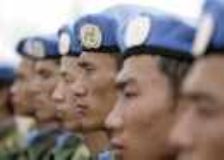Chinese peacekeepers begin work in Darfur
February 1, 2008 (DUREIJ, Sudan) — Their clocks are set on Beijing time, they use state-of-the-art equipment and – most of all – they are welcome by the Sudanese government. In just about everything, the Chinese peacekeeping contingent in Darfur is strikingly different from the rest of the U.N. mission here.
 The 140 Chinese engineers and troops deployed in Darfur were among the first reinforcements sent by the United Nations, which took over peacekeeping in the western Sudanese region in January. The Sudanese government quickly approved the Chinese contingent, even as it vetoed contributions from other countries because they were not African – including a Scandinavian engineering corps.
The 140 Chinese engineers and troops deployed in Darfur were among the first reinforcements sent by the United Nations, which took over peacekeeping in the western Sudanese region in January. The Sudanese government quickly approved the Chinese contingent, even as it vetoed contributions from other countries because they were not African – including a Scandinavian engineering corps.
The Chinese deployment comes amid accusations by human rights activists that China is partly responsible for Darfur’s chaos because of its staunch diplomatic backing of the Sudanese government.
Five years of fighting between the Sudan’s Arab-dominated government and Darfur’s ethnic African rebels has killed over 200,000 people and chased 2.5 million to refugee camps, largely black African civilians. Arab militias allied with the government have been blamed for many of the atrocities; the government denies backing them.
Energy-hungry China is Sudan’s key political and economic ally, investing in the country and importing over two-thirds of its oil output, estimated at about 500,000 barrels daily. Since fighting broke out in Darfur in 2003, it repeatedly used its veto power in the U.N. Security Council to prevent tough measures against Sudan.
London-based Amnesty International said in a report last year that China was ignoring a U.N. arms embargo on Darfur by continuing to deliver weapons to the Sudanese government, which can then ship them to its wartorn western province. China denied the allegations.
At the airport in Nyala, capital of South Darfur, the Sudanese military has for years parked several Chinese-made fighter jets. An Associated Press reporter has repeatedly seen them operate in Darfur despite a U.N. ban on military flights over the region.
Because of those ties, some Darfur rebel groups don’t view the Chinese as neutral peacekeepers and have opposed their deployment. There have also been rebel attacks on Chinese-owned oil fields near Darfur.
“We’ll be watching all of them very closely,” said one rebel in Nyala, who spoke on condition of anonymity because he operates covertly in a government-held town.
Li-Cheng wen, China’s ambassador to Sudan, dismissed the rebel concerns.
“We hope these groups won’t misunderstand the role and the neutrality of the Chinese,” he told the AP as he inspected the Chinese troops at a U.N. base near Nyala.
He argued that China’s economic cooperation does more to pacify Sudan than trade sanctions – such as those inflicted by the United States.
“The Darfur problem is not caused by China,” said Li-Cheng. “We have strongly invested in Sudan and this benefits the prosperity and stability of the country.”
Beijing trumpets its peacekeeping mission to Sudan and other countries as evidence of its growing international role. At the same time, it remains uncomfortable with such interventions and emphasizes that it participates in missions only with the approval of local governments.
Activists want China to use its influence to facilitate the deployment of all necessary U.N. equipment and troops. The mission so far has some 9,000 troops and police – less than half the 26,000 planned to pacify a region nearly the size of France. Most are under-equipped African units, and U.N. peacekeeping chief Jean-Marie Guehenno has repeatedly said the force could fail without urgent help.
Despite months of pleas, U.N. officials say wealthy Western nations have so far failed to send some of the equipment the mission needs, such as helicopters.
They blame Sudan’s government for most of the delays, saying the government is stalling on issuing visas to some U.N. staff and still not agreeing on a Status of Forces Agreement that allows peacekeepers to operate.
U.N. officials say the mission needs equipment and expertise that African countries cannot provide, but Sudan has resisted offers from outside the continent.
Actress Mia Farrow, who is spearheading a campaign for China to push Sudan to stop obstructing the U.N. deployment, believes the Chinese unit is a “smoke screen to hide what’s not happening in Darfur,” referring to the stumbling U.N. operation.
“China could do much more,” she said.
Still, activists hope China will budge because it wants to burnish its image ahead of the summer Olympic Games in Beijing. They say recent comments by Liu Guijin, China’s special envoy for Darfur, who has called on Sudan to cooperate with the international community, are positive.
Politically cautious, China prefers to send medical and engineering troops rather than soldiers who might find themselves in the line of fire.
At the U.N. base, sparkling white Chinese bulldozers, shovels and armed personnel carriers are among the largest U.N. gear that Sudanese customs has allowed into Darfur. The Chinese peacekeepers are friendly with the Nigerian troops sharing their base, who say they were impressed by daily karate routines of the Chinese.
The Chinese emphasize they haven’t come to Darfur to fight. At the moment, they are building a large new base where the U.N. mission plans to house some troops.
Nearby, Chinese troops built bulletproof barriers around the compound, as Chinese armored personnel carriers scattered across the arid landscape provided protection.
“The work here should take us many months before reinforcements arrive,” said Maj. Chen, who was supervising the construction. He said the contingent will reach a total of 315 Chinese in coming months.
(AP)
